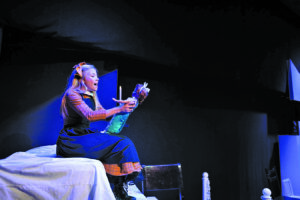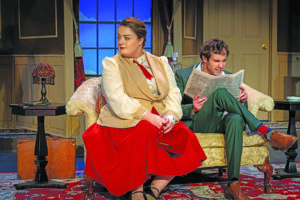The City of Falls Church is a tiny jurisdiction disproportionately dependent for operating revenues on residential real estate taxes. With the recent years’ rapid growth in residential real estate values tanking in 2006, rising less than half a percent, it came as a surprise to the City Council Monday night when City Manager Wyatt Shields proposed a new budget that would fully fund the schools and require only a one cent increase in the real estate tax rate.
A whopping 13% growth in the value of commercial real estate, resulting from the recent years’ construction of a series of new large-scale, mixed use development projects, is credited with offsetting the flat residential property market to minimize misery in the new budget.
Shields submitted his first annual operating budget recommendation since being named City Manager of Falls Church last fall, negotiating a precipitous decline in the residential real estate growth rate to emerge with a $71,070,649 budget for the coming fiscal year requiring a single penny increase in the tax rate. He proposes the rate rise from $1.01 per $100 of assessed valuation to $1.02.
The package includes a 5.2% increase in the City’s allocation to its school system, as requested by the School Board. While the schools’ budget increase was higher than originally hoped, it was less than half the annual growth rate of recent years and School Board Chair Craig Cheney made a compelling case in the presentation of the budget to the City Council for why it is needed.
The growth rate on the City side of the proposed FY 2008 budget is 3%. While the average single family residential home in Falls Church grew in value by less than half a percent, overall growth in revenue from land value assessments associated with the mixed-use commercial projects now under construction in the City hit a higher-than-expected 13%.
The ball is now in the court of the City’s seven-member City Council, which has slated an aggressive schedule of public hearings and work sessions before making its final decision on the budget and the tax rate on April 23. The new budget will become operational on July 1.
The first work session is tonight, Mar. 15, a joint session with the School Board in the training room at City Hall at 7:30 p.m.
A major shift in emphasis in Shields’ budget moves resources from payroll costs of upper management to fund five new positions that provide direct program support and customer service. The new positions include a building electrical inspector, an environmental services civil engineer, a recreation and parks maintenance worker and program supervisor, and a public safety parking enforcement officer.
Funding the shift is proposed by not filling two upper management level slots that became vacant the last year, one opened when Cindy Mester moved from heading the Human Services Department to become Assistant City Manager. Shields consolidated the housing and human services, recreation and parks and library divisions under a single department, also leaving unfilled Mester’s former assistant slot. Howard Herman, long-time head of the City’s Recreation and Parks, was named acting general manager of the new consolidated department.
The budget also invests $100,000 for employee training and the development of performance benchmarks for all functions related to water and sewer services. It also calls for the continuation of the City’s policy of replacing vehicles with new hybrids. A major new expense is federally-mandated pre-funding future post-retirement obligations which will save money in the long run, but will cost $2 million this year. Fortunately, most of that will be paid for out of the City’s current fund balance, meaning it will not require significant new revenue in the coming year.
In other revenue generating areas, the proposed budget calls for no change in the water and sewer rates, despite the City’s commitment of $950,311 for its share toward upgrades of the Arlington and Fairfax county wastewater treatment plants, as well as the maintenance of existing facilities and pipes.
The City will draw $2.6 million, the same as last year, as its “return on investment” from the water system to help pay for its operating expenses.
Shields proposes raising the cigarette tax from 65 cents per tax to 70 cents, bringing in an estimated additional $40,000. Other taxes, such as the business license (BPOL) tax will remain unchanged.
Prior to Shields’ power-point presentation of his budget Monday, School Chair Cheney acquitted the School Board budget request by focusing on the need to make up for a $300,000 drop in expected state and federal funds.
But he said the $1.44 million increase in the budget included $1.47 million for staff compensation. While the School Board did not comply with teacher and staff wishes for a 2.8% cost of living adjustment, holding the increase to 2%, it did significantly adjust the compensation schedule for new, incoming teachers.
The Falls Church system had fallen to fifth among the five regional school jurisdictions in the compensation offered entry-level teachers. That could be a disaster, Cheney explained, as in addition to the usual turn-over, 25 to 30 veteran teachers in the Falls Church system are planning or contemplating retirement in the next year or so.
In addition, he said, Virginia colleges and universities graduate less than half the number of prospective teachers each year than the state’s schools need. This means that competition for good teachers is at a premium. The school board felt it was vital that it increase entry-level Bachelor’s degree compensation from roughly $39,000 to $42,000 a year, moving the system up the ladder from fifth to third among school systems in the immediate area.
In addition, he noted, Falls Church schools will begin offering courses in Arabic and Chinese language studies, and expanded collateral activities have resulted in such things as the advent of a competitive swim team for the first time.
While residential real estate values, reflected in new assessments sent out to all City residents last weekend, rose only 0.48% in the last year, the good news was that in the commercial areas, the City’s revenues grew much faster. Commercial real estate grew by 10.5%, sales tax grew by 7.62%, and business license taxes grew by 5.75% to a projected $3.363 million for the coming year.
In terms of the total assessed values of real estate in the City, residential properties grew by 2.4% (buoyed by the onset of the residential units at the mixed-use Byron project and some new residential improvements), while commercial properties grew in value by 12.9%. Still, the commercial component is only 26% of the City’s total ($864 million of $3.3 billion).
New construction, including of the Byron, generated $1.6 million in new revenue for the City, where a penny on the real estate tax rate equals about $350,000.
Total operating revenues to the City are estimated at $62,783,255, with another $8,287,394 coming in through grants, totaling the $71,070,649 for the budget.











